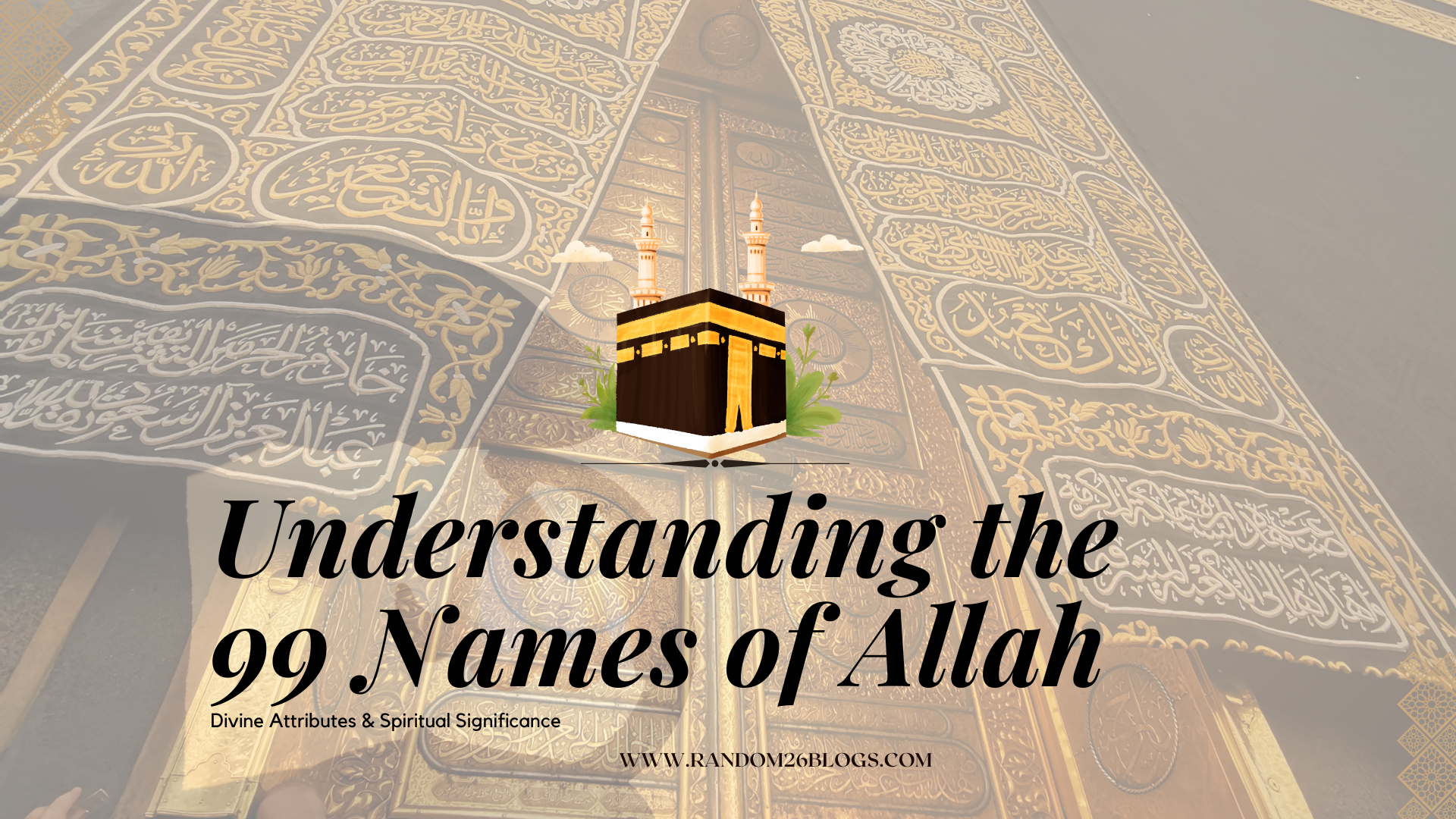
Thumbnail titled 'Understanding the 99 Names of Allah' with subtitle 'Divine Attributes & Spiritual Significance,' featuring golden Arabic calligraphy and Islamic geometric patterns for a blog post."
Discover the profound meaning of Allah’s 99 Names (Asma ul Husna), their Quranic origins, and how they inspire faith, healing, and spiritual growth in daily life.
Table of Contents
Introduction: The Divine Beauty of Asma ul Husna
The 99 Names of Allah, known as Asma ul Husna (أسماء الله الحسنى), are more than titles—they are a gateway to understanding Allah’s infinite mercy, wisdom, and power. The Quran emphasizes:
“And to Allah belong the best names, so invoke Him by them” (Quran 20:8).
These Names are a roadmap for Muslims to deepen their connection with the Divine. Let’s explore their significance, key examples, and practical applications.
1. The Significance of the 99 Names of Allah
Rooted in the Quran and Sunnah
Allah’s Names are derived from the Quran and authenticated Hadiths. The Prophet ﷺ said:
“Allah has 99 Names; whoever memorizes and acts upon them will enter Paradise” (Sahih Bukhari).
Each Name reflects a unique attribute, such as Al-Rahman (The Most Merciful) or Al-Hakim (The All-Wise).
A Framework for Worship
By reflecting on these Names, believers align their hearts with Allah’s will. For instance:
- Al-Ghaffar (The Forgiver) inspires repentance.
- Ar-Razzaq (The Provider) fosters gratitude.
IStrengthen your worship routine with our Step-by-Step Guide to Performing Salah.
2. Key Names & Their Meanings
Al-Rahman & Al-Rahim (The Most Gracious, The Most Merciful)
These Names open nearly every Surah in the Quran. While Al-Rahman embodies universal mercy for all creation, Al-Rahim signifies specific mercy for believers.
Al-Wadud (The Loving)
Allah’s love transcends human understanding. This Name reminds us that His compassion is unconditional, even in trials.
As-Salam (The Source of Peace)
In times of chaos, invoking As-Salam brings inner tranquility. The Quran states:
“He is Allah—there is no god except Him, the King, the Holy, As-Salam…” (59:23).
3. How to Incorporate the Names into Daily Life
In Supplication (Dua)
Use the Names to personalize your prayers. For example:
- “Ya Razzaq, bless my family with sustenance.”
- “Ya Shafi, heal my loved ones.”
In Reflection (Tafakkur)
Ponder Names like Al-Baseer (The All-Seeing) to cultivate mindfulness of Allah’s presence in every action.
In Salah
Recite Names during prostration or before Tasleem. For example, silently repeat “Ya Rahman, Ya Rahim” during Sujood.
Learn how daily Quran recitation enhances spirituality in Benefits of Reciting the Quran Daily.
4. Spiritual Benefits of Knowing Allah’s Names
- Strengthens Tawhid (Monotheism): Deepens awareness of Allah’s uniqueness.
- Heals the Heart: Names like Al-Jabbar (The Restorer) offer hope in hardship.
- Guides Ethical Choices: Al-Adl (The Just) inspires fairness in dealings.
FAQs About the 99 Names of Allah
Q: Are the Names limited to 99?
A: No—Allah has infinite attributes, but 99 are specifically highlighted in the Hadith.
Q: Can I recite the Names for specific needs?
A: Yes! For example, recite Ya Qawiyy (The Strong) for strength or Ya Hafiz (The Protector) for safety.
Q: How do I memorize them?
A: Use apps like “99 Names of Allah” or divide them into groups of 10 for daily review.
Embrace the Divine Connection
The 99 Names of Allah are a treasure trove of spiritual wisdom. By studying and invoking them, you unlock blessings, guidance, and a deeper love for your Creator.
Internal Linking Suggestions:
- Explore daily spiritual habits in Benefits of Reciting the Quran Daily.
- Deepen your Salah practice with our Step-by-Step Guide to Performing Salah.
99 Names of Allah, Asma ul Husna, Divine Attributes, Islamic spirituality, dua through Allah’s Names.
Muslims seeking spiritual growth, new converts, Islamic educators, and anyone curious about Allah’s attributes.
By embracing the Asma ul Husna, you transform faith from a concept into a living, breathing relationship with the Divine. 🌟






